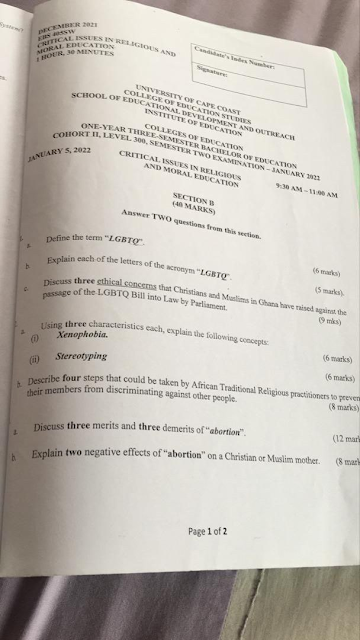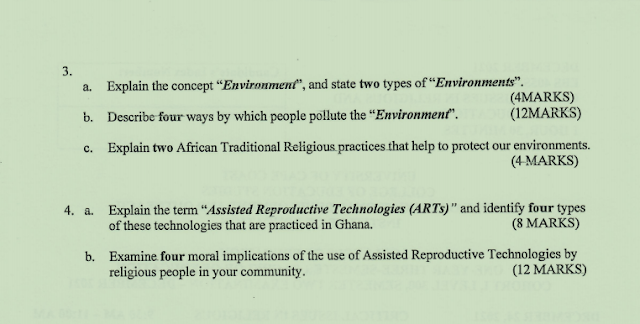- Back to Home »
- MOST LIKELY QUESTIONS: CRITICAL ISSUES IN RME
الأحد، 15 أكتوبر 2023
MOST LIKELY QUESTIONS: CRITICAL ISSUES IN RME
LIKELY EXAMINABLE
CLICK HERE THRICE TO JOIN OUR SECRET GROUP
1. Discuss the following types of prejudice
a. Xenophobia
b. Racism
c. Sexism
d. Classism
e Racism
f. Ageism
g. Religious prejudice 10 MARKS
b. Explain the term "Assisted Reproductive Technologies (ARTs)" and identify four types of
these technologies that are practiced in Ghana. 10 marks
2. Discuss four points each of the Islam and Traditional responses to Abortion 20marks
3. Discuss four types of values with relevant examples.
b. Enumerate three reasons why value-based education is necessary. 20marks
4. Differentiate between absolute morality and relative morality. 10marks
b. Discuss three importance of a good conscience 10 marks
5. Discuss the following layers of the atmosphere
i. stratosphere
ii Mesosphere
iii. Exosphere
iv Troposphere
b. Explain three benefits and demerits each of the greenhouse effect
c. List two reasons why acid rains are vital.
CLICK ON THE IMAGES TO ENSURE CLARITY
FIRST SET
For items 1 to 20, each stem is followed by four options lettered A to D. Read each item
carefully and write the letter of the correct or best option.
1. The branch of knowledge that deals with the origin and evolution of the universe is
known as ...
A. Axiology.
B. Cosmology.
C. Metaphysics.
D. Ontology.
2. Love andAffection are examples of ……………………………………………………..
A. Aesthetic Values.
B. Moral Values.
C. Sentimental Values.
D. Spiritual Values.
3. Which one of the following statements is not true about morality?
A. Moral codes are developed to serve the interest of all people living in society.
B. Morality is a social phenomenon, rather than being an individual phenomenon.
C. Morality is applied to individuals even when they are living alone in society.
D. Morality is applied to individuals only when they interact with other persons.4. Which one of the following adjectives cannot serve as a characteristic of religious
morality?
A. Absolute.
B. Objective.
C. Relative.
D. Universal.
5. Which one of the following statements is not true about Ethics Education?
A. Ethics deals with collective decision-making.
B. Ethics deals with individual decision-making.
C. Ethics deals with what is good for individuals.
D. Ethics deals with what is good for society.
6. In the 1960s, Dr. Kwame Nkrumah made an attempt to replace the teaching of Religion
in Ghanaian basic schools with the subject
A. Citizenship Education.
B. Cultural Studies.
C. Moral Education.
D. Moral Teaching.
7. The Sun belongs to a galaxy called ……………………………………….
A. Cosmos.
B. Milky Way.
C. Planet.
D. Solar System.
8. What is the meaning of the acronym NASA in space science?
A. National Aeronautics and Space Administration.
Page 2 of 2Page 3 of 3
B. National Aeronautics Science Association.
C. National Association of Space Administrators.
D. National Association of Space Aeronautics.
9. Thomas Lickona has made tremendous contributions to the study of ………………………….
A. Character Education.
B. Ethics Education.
C. Moral Education.
D. Religious Education.
10. Religious and Moral Education is a subject that deals with
I.
Religious Issues
II. Moral Issues
III. Social Issues
IV. Contemporary Issues
A. I
B. I & II
C. I, II & III
D. I. II, III & IV
11.Conscience is derived from the Latin word “conscientia ”, which means
A. being innocent.
B. having clear conscience.
C. having inner feeling.
D. privy of knowledge.
12.Probity andAccountability are examples of …………………………………………
A. Aesthetic Values.
B. Economic Values.
C. Moral Values.
D. Political Values.
13. Which one of the following subjects examines themes like what moral questions mean,
and on what basis people can know what is ‘True’ or ‘False’?
A. Applied Ethics.
B. Development Ethics.
C. Meta-Ethics.
D. Normative Ethics.
14. In Moral Philosophy, the Ethics of Right is referred to as ……………………………
A. Cosmology.
B. Deontology.
C. Teleology.
D. Theology.
15. The act of having sexual intercourse with many people or multiple sex partners is
described as ...
A. Heterosexual.
B. Promiscuity.
C. Prostitution.
D. Recreational Sex.
16. Which one of the following factors may not affect human sexuality?
A. Biological factors.
B. Cultural factors.
C. Psychological factors.
D. Religious factors.
THIRD SET





























